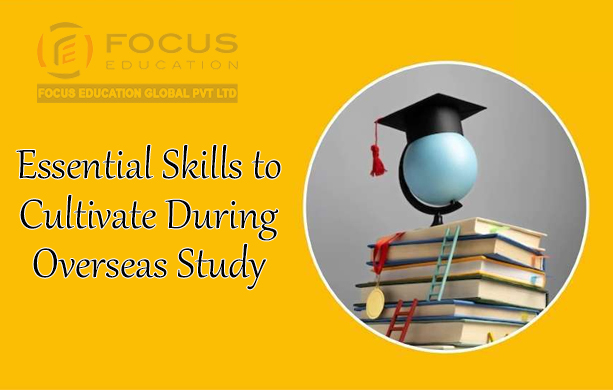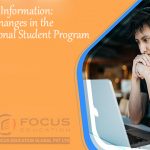Essential Skills to Cultivate During Overseas Study
Embarking on the journey of studying in a foreign country entails more than just academic expertise. It demands a range of essential skills that exceed the boundaries of traditional classroom learning, equipping students to navigate the intricacies of international education. This guide will thoroughly examine 10 pivotal points that are indispensable for every student before venturing abroad to study. By acquiring and honing these essential skills before embarking on your study abroad journey, you can approach the experience with confidence, resilience, and preparedness. This guide aims to equip students with a historical toolkit of skills that will not only enhance their academic performance but also enrich their overall study-abroad experience.
1. Cultural Competence
Cultural competence goes beyond simply acknowledging cultural differences; it involves actively seeking to understand and engage with diverse perspectives. This skill is particularly crucial in the context of international education, where students are exposed to numerous cultures and traditions. Active participation in intercultural events and exchanges is another effective way to foster cultural competence. By engaging in dialogue with individuals from different backgrounds, students can broaden their perspectives, challenge their assumptions, and develop empathy and respect for cultural differences. Furthermore, connections within the local community are essential for developing cultural competencies. By building relationships with locals, one can gain insights into the social norms, values, and customs of the host country, ultimately enriching the study abroad experience. Hence, actively engaging with diverse cultures and perspectives, not only enhances personal growth but also contributes to the more inclusive and interconnected global community.
2. Adaptability
Adaptability is a crucial trait for students embarking on the journey of studying abroad, it involves the capacity to swiftly navigate through novel and unfamiliar situations that often accompany the experience of living and learning in a foreign country. Whether confronted with climate differences, diverse academic demands, or unfamiliar social norms, the ability to adapt is essential for thriving in such varied environments. To develop adaptability, students must be willing to step out of their comfort zones and embrace change. This entails being proactive in seeking opportunities for personal growth and learning from the diverse encounters that studying abroad offers. By cultivating adaptability, you not only ensure survival but also pave the way for flourishing amidst the dynamic and ever-evolving landscape of international education.
3. Communication Skills
Communication skills are essential for thriving in the realm of international education. Whether it’s expressing oneself clearly or understanding others effectively, the ability to communicate plays a key role in connecting with peers, professors, and the local community. Improving communication skills encompasses various strategies. Seeking opportunities to enhance language proficiency, whether through language courses or immersive experiences, is another vital aspect. A well-developed capacity to articulate thoughts, seek assistance when needed, and engage in meaningful conversations significantly enriches the study abroad experience. It fosters deeper connections with people from diverse backgrounds and facilitates smoother integration into the academic and social fabric of the country. Ultimately, strong communication skills contribute substantially to the overall success and satisfaction of international education endeavours.
4. Effective Time Management
Effective time management is essential for students navigating the multilayered landscape of studying abroad. Developing strong time management skills involves several key strategies. Primarily effective planning is crucial including setting clear priorities and establishing realistic goals to guide one’s schedule. Moreover, creating structured schedules helps the student to allocate time appropriately to various activities, ensuring they stay on track with their academic and personal objectives. Flexibility is essential as unexpected opportunities or challenges may arise during the study abroad journey. Hence, proficient time management fosters a sense of control and accomplishment, enhancing overall well-being and satisfaction. Students who excel in these skills are better equipped to seize opportunities, navigate challenges, and maximize their growth and learning potential during their time abroad.
5. Problem Solving
Nurturing problem-solving capabilities involves various strategies. Engaging in experiential learning opportunities provides hands-on experience in navigating real-world challenges. Collaborating on group projects allows students to tap into collective wisdom and brainstorm creative solutions. Seeking guidance from mentors who have traversed similar paths can offer valuable insights and strategies for overcoming difficulties. Beyond academic success, mastering problem-solving skills equips students with a vital toolset for addressing the complexities of professional life. The ability to tackle challenges with resilience and resourcefulness is highly sought after in today’s competitive era. Hence, investing in the development of problem-solving skills during studies will not only enhance academic performance but also foster invaluable preparation for a future career.
6. Independence
Independence is more than just a perk as it’s a transformative aspect of studying abroad. As students venture into unfamiliar territories, they are confronted with opportunities to cultivate self-reliance and autonomy. Financial management for instance becomes a significant aspect of independence as students must learn to budget effectively, allocate resources wisely, and prioritize expenses to sustain themselves throughout their time abroad. Navigating daily life in a new environment also requires independence. From understanding public transportation systems to seeking medical assistance when needed, students must learn to navigate facets of daily life autonomously. This newfound sense of independence serves as a solid foundation for future endeavours, equipping students with the flexibility and resourcefulness needed to thrive in an ever-changing world.
7. Resilience
Building resilience is a multifaceted process that involves several key components. Firstly, cultivating a positive mindset is essential. This involves reframing challenges as opportunities for growth and viewing setbacks as temporary obstacles rather than insoluble barriers. Additionally seeking support from peers, mentors, and support networks can provide invaluable encouragement and guidance during difficult times. Embracing the learning opportunities inherent in adversity is another crucial aspect of resilience. By confronting challenges head-on and actively engaging with the lessons they offer, students can develop resilience and adaptability. Ultimately, possessing resilience equips students with the fortitude to navigate the highs and lows of studying abroad. By transforming challenges into opportunities for personal and academic growth, resilient individuals emerge from their international education experience stronger, more resilient, and better prepared to face the uncertainties of the future.
8. Open-Mindedness
Open-mindedness is a crucial mindset for students embarking on the adventure of studying abroad. To cultivate open-mindedness, students can actively seek exposure to diverse cultures through immersive experiences and cultural exchange programs. Embracing open-mindedness not only enriches the study abroad experience but also prepares students for an increasingly interconnected world. By embracing diverse perspectives and being willing to learn from others, students can expand their horizons, enhance critical thinking skills, and develop a greater sense of empathy and understanding. By adopting diversity and being receptive to new ideas, students can fully immerse themselves in the rich tapestry of experiences that studying abroad offers, ultimately leading to personal growth and broader worldwide.
9. Financial Literacy
Financial literacy is a life skill participating in modern society. It encompasses the ability to effectively manage finances, including budgeting, expense tracking, and understanding currency exchange rates. To develop financial literacy, students must familiarize themselves with the local currency and exchange rates. This knowledge enables them to accurately assess the cost of living in their host country and plan their budgets accordingly. By identifying essential expenses and discretionary spending, students can allocate their funds wisely and avoid overspending. Furthermore, exploring cost-effective strategies for managing daily expenses is key to maximizing financial resources. By understanding budgeting, managing expenses, and making informed financial decisions, students can alleviate financial stress and focus on making the most of their international education experience.
10. Interpersonal Skills
In the context of studying abroad, interpersonal skills are like the glue that binds individuals together in a foreign environment. Empathy for instance allows students to understand and connect with people from diverse backgrounds, fostering a sense of amity and mutual respect. Besides, collaboration is paramount in navigating the challenges and seizing the opportunities that arise during the study abroad experience. Additionally, actively seeking out opportunities for cultural exchange enables students to broaden their horizons, appreciate different perspectives, and develop a global mindset. These connections not only enrich their study abroad journey but also serve as a valuable asset for future endeavours. Whether it’s forging professional collaborations or nurturing lifelong friendships, proficient interpersonal skills open doors to a myriad of possibilities beyond the confines of the study abroad experience.
In summary, preparing essential skills ahead of studying abroad is paramount for a fulfilling and rewarding experience. Whether it’s acclimating to diverse cultures, handling finances wisely, or adjusting to unfamiliar surroundings, these competencies equip students to maximize the benefits of their international educational endeavours. Moreover, discerning the disparities between studying in a developing nation versus a developed one empowers students to make informed choices regarding their academic pursuits and cultural immersions, facilitating a more comprehensive and proactive approach to their study abroad escapade. Armed with this knowledge, students can tailor their expectations and preparations accordingly, ensuring a smoother transition and a more enriching experience overall.
Thus, to know more about studying abroad you can in touch with our international education experts at Focus Education who will help you with the process of your academic career.



